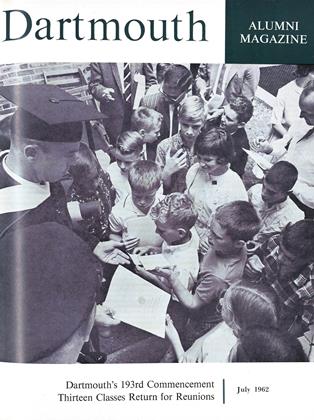As an impromptu speaker near the close of the Commencement exercises, Commander Alan B. Shepard Jr.addressed the following remarks to the graduating class.
PRESIDENT DICKEY, faculty, friends of Dartmouth, members of the canine corps, and fellow classmates. A few months ago I received a letter from Hanover that said: "Dear Commander Shepard: We would like to have you come to Hanover for a quiet weekend." Here I stand and I still have the letter in my pocket. President Dickey quietly referred to my origins in New Hampshire; he quietly referred to my father's class, 1913, and I suppose in deference to the Class of 1912, we should call the Class of '13 the forty-niners. It is for these two reasons, of course - coming from New Hampshire and having a Dartmouth graduate for a father - that I am particularly proud to be here today.
I'll only say a few words because I am anxious to get water skiing this afternoon and I'm sure you're anxious to get on to other pursuits. From the looks of some of the young ladies' faces here I understand that these pursuits will terminate abruptly in several chapels before too long.
I would like to say a few words about national strategy and national posture. My classmate, Mr. Dean, has very nicely defined national strategy. I would like to do so again very briefly. It is, of course, many-faceted. It comprises military strategy, political strategy, psychological, economic, and more recently technological. I have had the opportunity to experience both military strategy in my work and, of course, more recently to experience the effect of technological strategy.
I think quite possibly some of you - maybe unwillingly - will have the experience in the future of military strategy and I'm sure that there are many of you who have had very close touch with technological strategy.
As a matter of fact, in our space program the Space Administration is opening a two-way street for the exchange of information between us and all the colleges and universities throughout the land. Of course I'm primarily interested in very objective technology. That's my business. On the other hand, there is a need for a great deal of research, and I hope that you gentlemen will endeavor to choose in part at least some of these fields.
Why do I feel so strongly about national strategy? Well, Mr. Dean just spoke about our present antagonist, the Russian ideology. I am quite firmly of the belief that we must have an antagonist in our society. In the theater, for example, without an antagonist the play is flimsy. I do not intend to speak specifically against the Communist challenge. Mr. Dean described that very nicely. I intend only to say that we must realize that for this society of ours to flourish — to exist — we must dove-tail all these facets of our national strategy into a posture that will enable us to exist.
Let me say this: That if you will promise to support our national strategy and our national posture, I will promise to continue to provide motivation.
Congratulations and thank you.
Many in the throng of 3,500 at the Commencement buffet dinner found the gym lawn a pleasant place to eat.
 View Full Issue
View Full Issue
More From This Issue
-
 Feature
FeatureOn Being a Full Man
July 1962 By ARTHUR H. DEAN, LL.D. '62 -
 Feature
FeatureThe Diminishing Citizen
July 1962 By BASIL O'CONNOR '12 -
 Feature
FeatureHONORARY DEGREE CITATIONS
July 1962 -
 Feature
FeatureThe Reunion Week
July 1962 -
 Feature
FeatureFive Alumni Awards Conferred
July 1962 -
 Feature
FeatureStrickland Heads Alumni Council
July 1962
Features
-
 Feature
FeatureRobert Frost on "Extravagance"
MARCH 1963 -
 Feature
FeatureThe Pros and Cons of Coeducation
FEBRUARY 1970 -
 Feature
FeatureANGLOPHILIA HITS THE CAMPUS
MAY 1966 By ARTHUR N. HAUPT '67 -
 Cover Story
Cover StoryTeachers in the Grand Manner
APRIL 1991 By DEBORAH SCHUPACK '84 -
 Feature
FeatureThe Wheelock Dream, Sparsely Realized, Is Still a Force in the Life of the College
OCTOBER 1965 By JOHN HURD '21 -
 Cover Story
Cover StoryRethinking The Stacks
December 1992 By Tig Tillinghast '93

